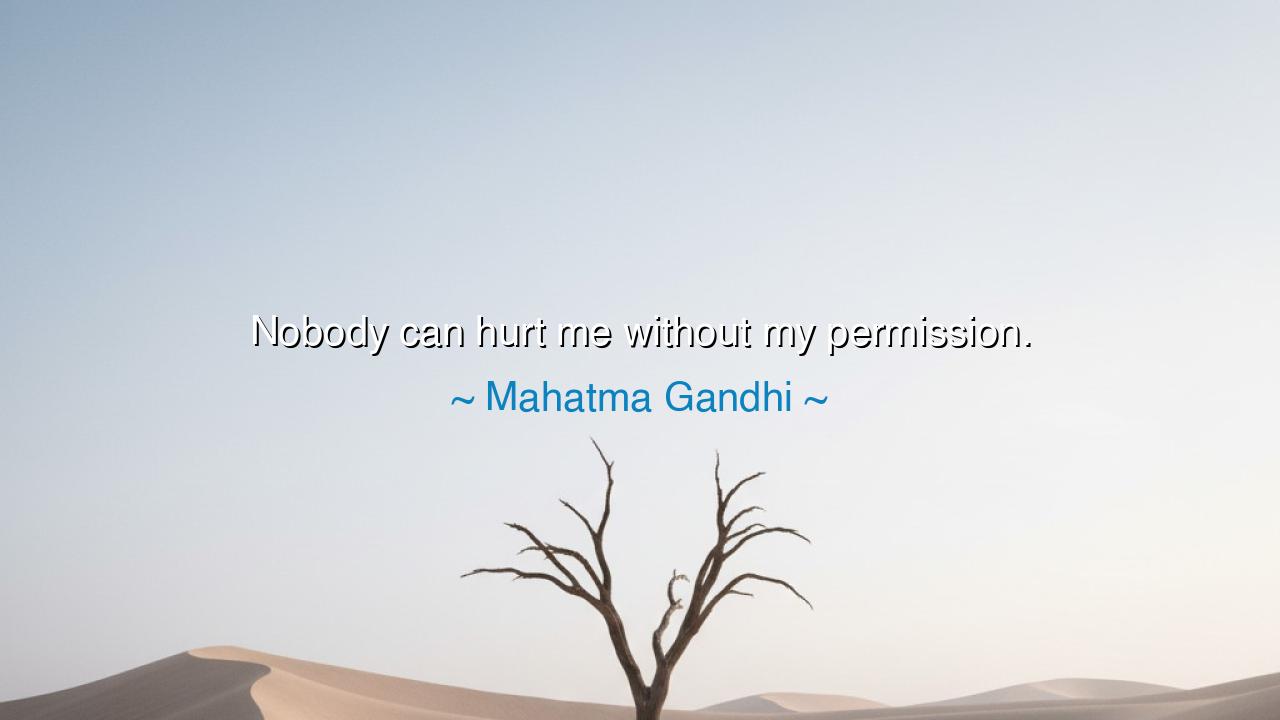
Nobody can hurt me without my permission.






“Nobody can hurt me without my permission.” Thus spoke Mahatma Gandhi, the apostle of nonviolence, whose words became both shield and sword in the struggle for freedom. In this saying lies a truth radiant and eternal: that the power of injury does not lie in the hand of the oppressor, but in the heart of the one who receives it. To be struck, to be mocked, to be scorned—these are wounds of the flesh and of circumstance. Yet the deeper wound, the one that festers in the soul, can only be inflicted if we grant it leave. The spirit remains sovereign unless it surrenders its crown.
The ancients also knew this wisdom. The Stoic philosophers, such as Epictetus, declared that no man can truly harm another’s soul without his consent. They taught that the body may be broken, wealth stolen, reputation slandered—but the inner citadel of the mind remains invincible, if guarded with discipline. Gandhi, walking in their footsteps, made this principle a weapon of peace. By refusing to let hatred poison his heart, he proved that chains and blows could not conquer his spirit. He alone held the key to his dignity.
Consider Gandhi’s own Salt March of 1930. The British sought to humiliate him, to arrest him, to strip him of power by brute force. Yet Gandhi remained unshaken. Though imprisoned, though reviled, he carried within himself the unyielding conviction that their cruelty could not define him. He granted them no permission to wound his soul. Instead, he turned their violence into his strength, for the world saw his calm endurance and recognized a might greater than any empire. Here, the truth of his words shines: oppression without consent is powerless.
So too in the story of Nelson Mandela. For twenty-seven years he was confined to the walls of Robben Island, cut off from family, stripped of freedom. Yet when he emerged, he bore not bitterness but resolve. Why? Because he had refused to give permission for hatred to rule him. His captors shackled his body but not his spirit. His forgiveness was not weakness but sovereignty—the declaration that they had never truly touched the essence of who he was.
The lesson is clear: hurt is not only what is done to us, but what we allow to enter us. Words of insult pierce only if we take them into our hearts. Acts of injustice break us only if we consent to despair. The one who withholds permission remains unbroken, like a fortress rising above storm and fire. This is not denial of pain—it is mastery over it. For though pain is inevitable, surrender is a choice.
O children of tomorrow, hear this: guard your inner kingdom well. Do not let the arrows of mockery, betrayal, or hatred pierce your spirit. They may strike your flesh, they may surround your life with trial, but your heart belongs to you alone. Let no man, no woman, no tyrant, no circumstance seize it. For if you refuse permission, you remain sovereign, untouchable, radiant in the face of darkness.
Practically, let each person do this: when hurt comes, pause before letting it settle within. Ask yourself, “Does this wound deserve entry into my soul?” If not, close the gates and let it pass. Train your mind with reflection, meditation, and prayer, so that your spirit grows unassailable. Remember daily that your dignity is not granted by others and therefore cannot be taken by them.
Thus remember Gandhi’s words: “Nobody can hurt me without my permission.” Carry them as a shield in the battles of life. For the world will strike, enemies will rise, storms will rage. But if you withhold permission, if you guard your spirit with strength, you will stand unbroken, and no force on earth will conquer you.






AAdministratorAdministrator
Welcome, honored guests. Please leave a comment, we will respond soon